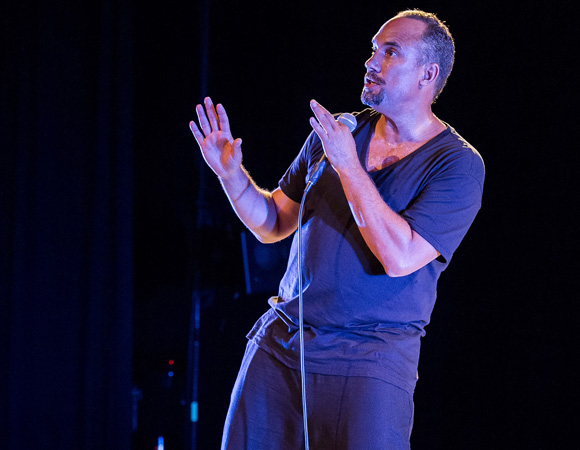Rodney King

(© Craig Schwartz)
Roger Guenveur Smith's explosive new one-man show starts with a bang. The play's narrator spews homophobic and racial slurs at his subject, Rodney King, and threatens his life. This definitely stirs the pot, but who is the narrator? Is it Smith, or is he dramatically using someone removed from himself, one whose views even Smith finds harsh? Because it is unclear whose 70-minute diatribe we are listening to, Smith's indictment of celebrity and justice in America is hollow.
Smith recaps the full Rodney King story for those who were not around for the fiery days following April 29, 1992. Police pulled over 25-year-old Rodney King in 1991 after a high-speed chase. Video captured the four cops sadistically beating King. This footage ran on the news continuously. Smith calls the event the first pre-internet viral video. One year later, an all-white jury in Simi Valley found the police officers innocent, the catalyst for a city-wide riot that locked down Los Angeles, led to numerous deaths, and left many businesses burned to the ground or looted.
The narrator charges King with sitting back and drinking while watching the horrors on TV in his name. He indicts King with being a puppet, giving his now-famous "”Can't We All Get Along" speech. Yet Smith, as author as opposed to as narrator, seems to have empathy for the dyslexic who suffers from hereditary alcoholism and was victimized by the law, by the rioters, and by history itself. Underneath the incendiary words, Smith focuses on this damaged man in pain, one with no intention of being a cause célèbre, yet who stood up when it was necessary and begged Pandora back into the box. When reliving the "Can't We All Get Along" speech, Smith paints a man worthy of pathos, who had to make up his words extemporaneously because he could not read what the PR people had stuck in his face.
Smith improvises the script nightly, even more amazing because the hip-hop poetry is tightly woven. He cleverly turns phrases and uses verbal pauses as ammunition — like how he refers to the Ronald Reagan Lie…brary. Rage has rarely been so literate.
What Rodney King lacks is a distinguishable point of view. Without knowing who the narrator is, the audience is incapable of trusting his words. Does Smith represent the African-American community, the press, racism itself? Is Smith hiding behind his character, the narrator, to express his own feelings about King, or is the narrator completely separate? Is the audience meant to respect the words or ignore them as the blathering of a racist, homophobic villain? Because the audience has no idea how Smith feels about the narrator of his own piece, Rodney King is once again all alone with no one to speak for him.











